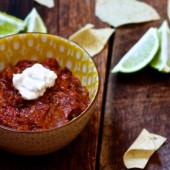
I’ve been meaning to address the topic of beets for some time because, like ramps, there seem to be divided camps: those who love them, and those who would veer across three lanes of rush hour traffic to avoid them.
I would plant myself firmly in the beet lover camp, although I do admit that they’re an acquired taste. They have an earthy mustiness that takes some getting used to, but once you’re there, rejoice. Because not only do they taste great, but they’re also one of the healthiest foods on earth.
A few of their benefits:
- They help clear out BPA that resides in everything from your water bottles to your canned vegetables
- They lower your blood pressure
- They’re rich in all kinds of vitamins and nutrients like vitamins B and C
I’m sure there are more, but the purpose of this post is to talk about this beet dish and why you need to make it now.
What some of you may not know is that the beet greens themselves are also edible. And I do hate it when vegetables/vegetable parts are described as “edible” since it suggests that you caaaan eat them, but why would you want to?
Beet greens aren’t just edible, but they have a flavor profile on par with Swiss chard, kale, and other leafy greens. The problem is that when you see beet greens in the grocery store, the greens have often seen a few too many days and ill handling, and they end up wilted and yellowing. Sometimes you may scratch your head and think “do moths eat beet greens?”
Those aren’t the delicious greens that I’m referring to. Head to your nearest farmers’ market to find just-picked beets and you’re in for a treat.
In celebration of all things beet, I decided to make a dish that uses all parts of the beet, nose to tail. So put on your beet butchering hat, and take a look at what I’m calling my Jerry Garcia beets.
Alternate titles for this post included “Hallucinogenic beets” and “Meaty nose-to-tail beets” but to keep the vegetarians and non-drug users reading, “Jerry Garcia beets” seemed to be a good compromise.
I also liked the sense that I was naming my dish after an actual person. When I’m reading through cookbooks, I’ll sometimes come across a dish titled after someone special in the author’s life, like “Rinka’s mom’s beans” or “Aunt Julia’s salad dressing”, which makes me think: who is this Rinka and why is he or she so lucky to have a mom who makes such fabulous beans? And why don’t I have a dish named after someone?
I did think of referencing one of my favorite culinary folk heroes, my Dad, famous for his raw flour and red wine Thanksgiving gravy, poured through the beak of a ceramic bird called “the puking chicken”.
But unfortunately – or fortunately – he has no connection to beets. Inspiration needed to come from somewhere else.
By happy accident the beets turned out this color:

Your reaction here might be “eeeew” (particularly if you’re a beet hater) or “awesome”. So I may be speaking to the minority of people who will agree with me, but multicolored creamed beets were the highlight of my day. And this isn’t joke food. This ain’t no Janet Jackson nipple cupcake, nor is it a cookie dough ice cream-filled taco. It’s real deal food; food that I would happily serve to friends and family, whether they live in California and can handle this kind of thing, or New York, where they’d have mild, wavelike panic attacks about all of that color.
It started as a simple idea. I set out to cook some creamed beets & beet greens, using all parts of the beet, from the vibrant stems to the lush greens.

continue reading














